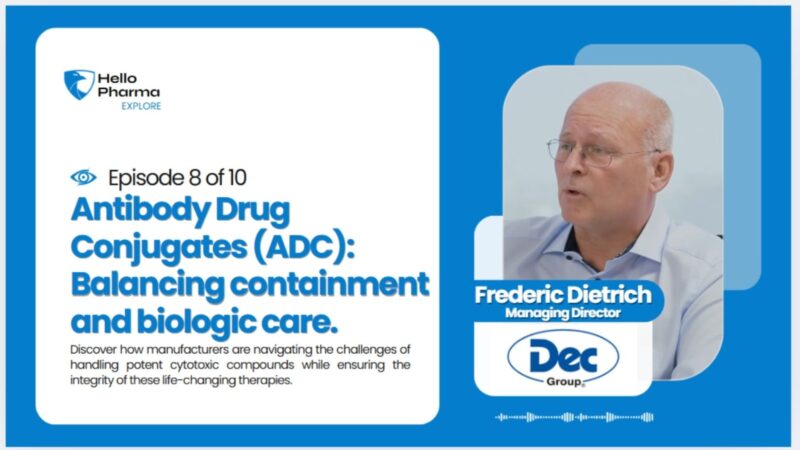Antibody Drug Conjugates (ADCs) represent one of the most promising frontiers in targeted cancer therapies, combining the precision of biologics with the potency of cytotoxic agents. In Episode 8, we explore how advanced manufacturing strategies and containment technologies are supporting the safe and efficient production of these complex molecules.
Joining us is Mr Frederic Dietrich, Managing Director of Dec Group, who shares his insights on the unique challenges posed by ADC manufacturing. ADCs consist of monoclonal antibodies linked to highly potent small-molecule drugs, requiring careful handling to protect both product integrity and operator safety.
The episode begins by outlining the dual nature of ADCs: they demand the same sterile conditions and biologic care as traditional biologics while also requiring high containment to manage the cytotoxic payloads. Mr Dietrich explains how this convergence of biologic and potent compound handling requires a new level of precision and control in manufacturing environments.
Containment solutions, such as isolators and closed transfer systems, are central to ADC production. These systems protect operators from potent compounds while also minimizing the risk of cross-contamination that could compromise product quality. Mr Dietrich discusses how modern containment designs can be tailored to the specific needs of ADC processes, ensuring that the potent drug-linker components are safely integrated with sensitive biologics.
Beyond containment, the episode delves into the broader process requirements for ADC manufacturing. From conjugation and purification to final formulation and filling, every stage must be carefully managed to maintain sterility and product stability. Mr Dietrich highlights how modular process design and integrated automation help ensure that these complex workflows remain consistent and compliant with global standards.
Digital infrastructure also plays a growing role in ADC production. With real-time monitoring and data-driven control, manufacturers can maintain precise conditions throughout the process, reducing variability and ensuring consistent product quality. Mr Dietrich discusses how this data-driven approach aligns with the evolving regulatory landscape, helping manufacturers meet rigorous expectations for biologic therapies.
As demand for ADCs grows, manufacturers are also focused on scalability. Mr Dietrich shares how modular and flexible facility designs support phased implementation and capacity expansion, enabling manufacturers to adapt as product pipelines evolve and new therapies enter development.
The episode concludes by reflecting on how the intersection of potent compound containment and biologic care is driving innovation in facility and process design. ADCs represent a powerful therapeutic class, and their production requires a careful balance of safety, sterility, and efficiency.
Join us as we explore how cutting-edge containment systems, modular manufacturing strategies, and digital integration are shaping the future of ADC production and biologic drug manufacturing.
For more resources and insights on pharmaceutical processing and advanced manufacturing technologies, visit www.hello-pharma.com.






